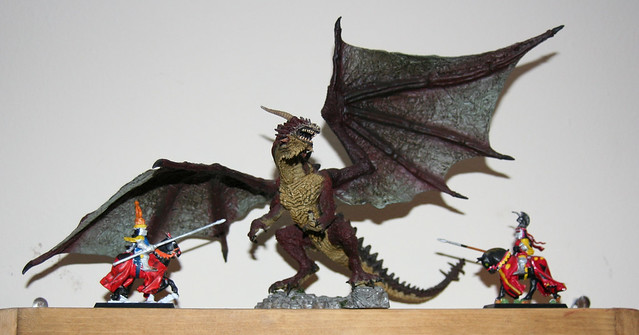 |
| Flickr.com |
I watched How to Train your Dragon the other day, and I, as I typically do as an English major, started to analyze it for deeper or more universal meaning. I found a few things, but I'll just share the one that relates to the topic of knowledge. When Hiccup went to learn more about the night fury in the book the vikings had compiled, he found nothing. Well, nothing useful for his situation. The vikings really hated the dragons (except for the glory they got from fighting them). And, although they wouldn't admit it, they kind of feared them, too. That's why it was such a big deal to kill a dragon--there wouldn't be honor in fighting something no one was afraid of. Thus, the information they included in their book about dragons was limited to what their prejudices and hate led them to think of the dragons. They didn't really want to know everything about the dragons—but to their view, all there was to know about the dragons was how they fought and how to best kill them. Instead of showing all the aspects of these creatures, they only saw the parts relevant to them—only the parts absolutely necessary for them to know for their purposes in interacting with them.
They saw the havoc the dragons wreaked on their village and went on damage control—they looked for the quickest way to get the dragons to stop setting their wooden houses on fire and eating their livestock—it was to kill them. I can't say I blame them: I'm pretty sure I'd start going for the kill if big dangerous things were torching my house and eating my future meals. . . . Yet, do you see how being stuck in "damage control" mode prevented them from really seeing what the dragons were after? And consequently, they postponed (possibly indefinitely) the chance to put a permanent end to the war between the two of them. Instead of looking for ways to deter the dragons from attacking (they must've learned early on that fighting the dragons didn't prevent them from coming in the future), they made harder weapons, made fire-proof shields, taught their children how to fight the dragons. They defined full warriorhood by what dragon they first killed. A bit interesting that they defined their culture around the dragons, even though they didn't want to look further into how the dragons worked. By ignoring the dragons' reasons for their behavior and focusing on fighting them, they created a permanent place for the dragons in their very culture, in the hopes and dreams of their children (wasn't it Hiccup's aspiration to kill a night fury to get positive attention from his peers and father?).
Examples of this kind of lack of understanding of another person/group abound in movies and literature:
In Shrek, Donkey seeing the dragon as an uncontrollable monster
In Othello, Othello perceiving Desdemona as his enemy because of the placement of her handkerchief
In Tarzan, Clayton seeing the gorillas as future piles of money, and Kerchak does not seek to understand what the humans are trying to do.
In To Kill a Mockingbird, Scout realizes that people have misunderstood Boo Radley
Does this relate to how we learn about our "enemies"?
I interviewed a soldier who worked in information in Iraq—that is, he helped question prisoners to learn about the area and investigate conflicts. While that sounds awful and may conjure up images from war or spy movies, I learned that "questioning" can take many forms, and soldiers really mostly try to understand the people and the culture they're deployed in. What this soldier found was that friendship often was more helpful than antagonism, and the more he just sought to understand the people he was working with, including their culture and their motivations and values, the more he could help the armed forces solve problems and ease conflict peacefully. He learned about peoples' world views and motivations for doing things. He learned that for some groups, family was most important, and for others, self-preservation. He learned the most from the people he developed friendship with—a connection with. And understanding why people did things helped immensely when it was crucial to know what the different clans were going to do, and how violence could be prevented. And they saw that when you really have the people's best interest at heart, you're more able to accomplish goals that benefit most people involved. That sounds awfully rosy-colored, I know, but if you think about it, that's the smart way with dealing with "enemies."
After all, "do we not destroy our enemies when we make them our friends"?
Rachel, I really enjoyed this post (and all the others you've posted so far!). Your thoughts echo with something I've been thinking about as I work on the proposal for my honors poetry thesis. I'm trying to write about how I believe poetry (and other forms of writing) encourage empathy for others in the reader. I loved the story about the soldier coming to understand Iraqi groups through friendship. I think that is what good writing does-- it helps us become friends with the writer or the person written about, which leads to greater understanding.
ReplyDeleteThanks for blogging, I'll definitely keep coming back to read more. :)